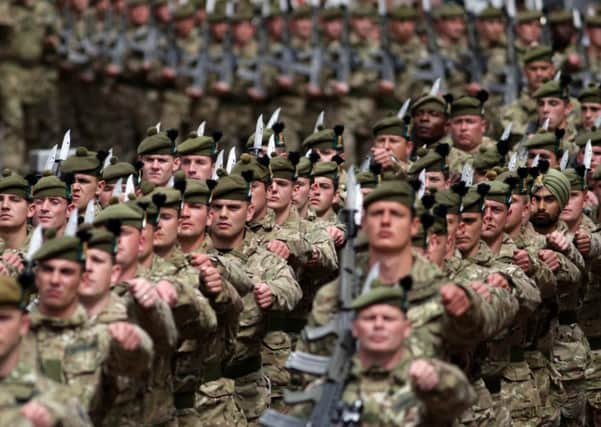Yes vote ‘worse than Suez’ for UK defence policy


In an article in the Chatham House Journal, Professor Andrew Dorman claims the loss of Scottish Labour MPs means it is more likely that the rest of the UK would leave the EU. He also warned that “it is far from guaranteed” that an independent Scotland would be allowed back into the EU and Nato.
However, his greatest concerns are on the rest of the UK’s spending power on defence, which he argues would drop by at least a twelfth without Scotland.
Advertisement
Hide AdAdvertisement
Hide AdHe has also criticised the Scottish Government white paper for containing few details on defence and failing to identify the foreign policy objectives on which a defence policy needs to be built.
But on the overall impact of a Yes vote, he added: “A ‘yes’ vote would constitute a seismic event for the UK far greater than the withdrawal from ‘East of Suez’, and could contribute to an exit from the EU.”
The withdrawal from east of Suez in the 1960s followed the humiliation of the Suez crisis, when a bid by Britain and France to militarily intervene against Colonel Nasser’s decision to block the Suez Canal to shipping and change the government was blocked by the US government.
The fiasco was an international humiliation for the UK, led to prime minister Sir Anthony Eden resigning and accelerated the dismantling of the Empire, ending the UK’s place as a leading imperial power.
However, the concerns in the paper were dismissed by SNP defence spokesman Angus Robertson.
Mr Robertson said: “Recently the RUSI think-tank used the word ‘reasonable’ in response to defence proposals by the Scottish Government for an independent Scotland, and the plans laid out in the white paper Scotland’s Future were described as co-operative. On the other hand – with just four months to the referendum – the MoD has consistently and repeatedly said it refuses to ‘spend any time planning for the possibility of a Yes vote’ – which is a dereliction of responsibility.”
But Labour’s shadow defence minister Gemma Doyle said: “This is yet another intervention from an expert making clear the failure of the nationalists to provide any credible policies on defence in a separate Scotland. It’s clear that the white paper manifesto for breaking up the UK was nothing more than a wish list without a price list.”
SEE ALSO